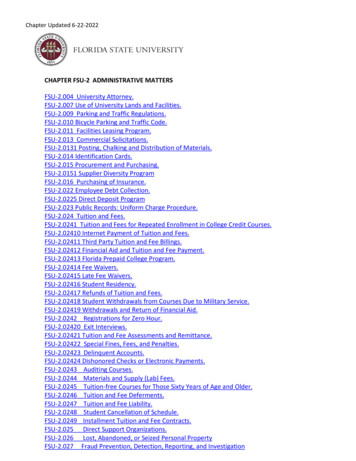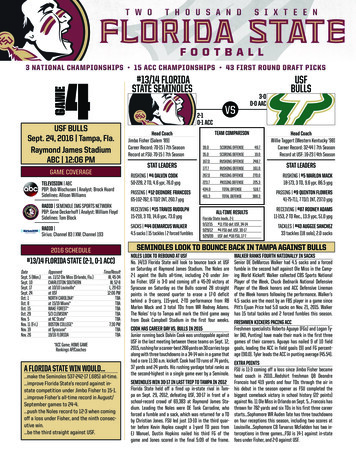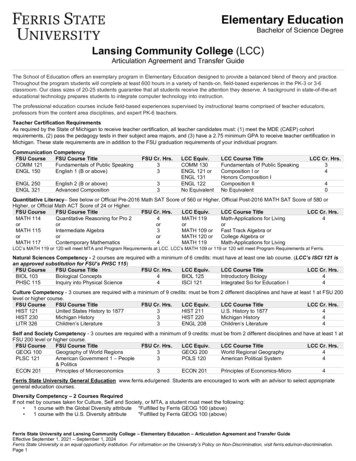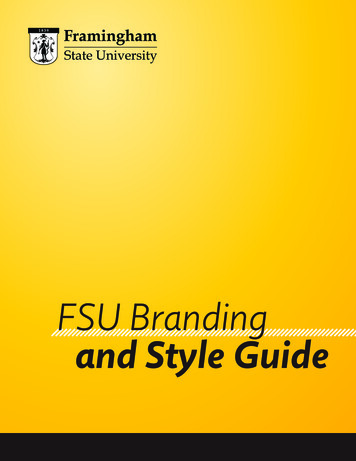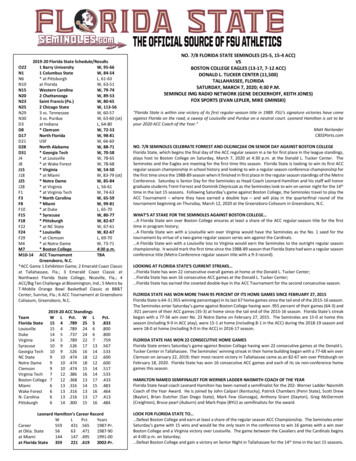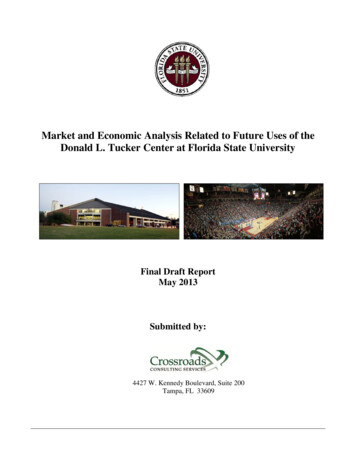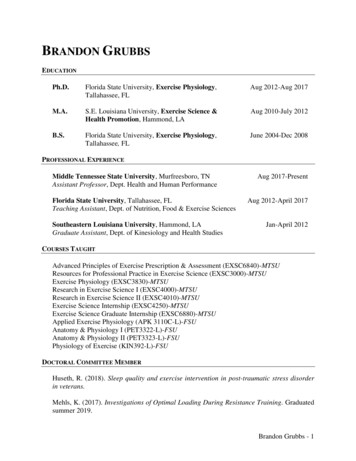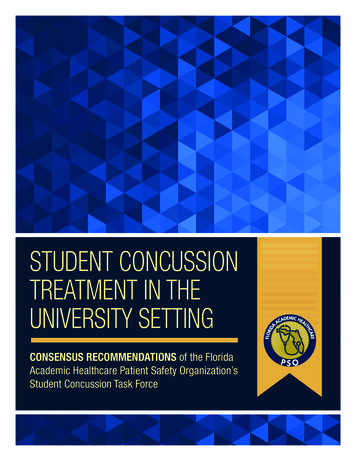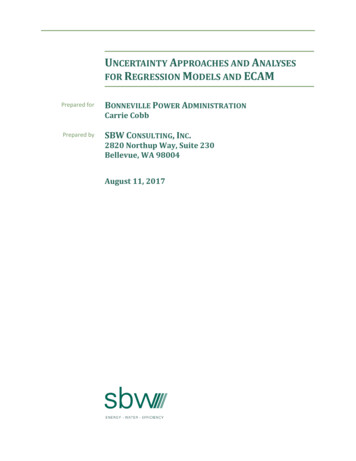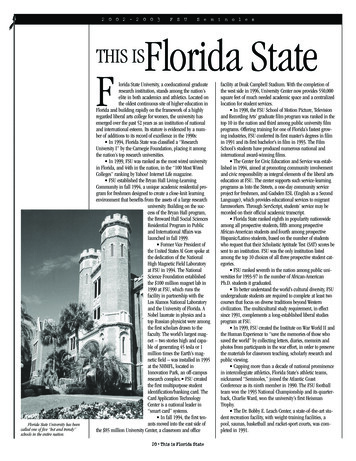
Transcription
2 0 0 2 - 2 0 0 3F S US e m i n o l e sFlorida StateTHIS ISFFlorida State University has beencalled one of five “hot and trendy”schools in the entire nation.lorida State University, a coeducational graduateresearch institution, stands among the nation’selite in both academics and athletics. Located onthe oldest continuous site of higher education inFlorida and building rapidly on the framework of a highlyregarded liberal arts college for women, the university hasemerged over the past 52 years as an institution of nationaland international esteem. Its stature is evidenced by a number of additions to its record of excellence in the 1990s: In 1994, Florida State was classified a “ResearchUniversity I” by the Carnegie Foundation, placing it amongthe nation’s top research universities. In 1999, FSU was ranked as the most wired universityin Florida, and 44th in the nation, in the “100 Most WiredColleges” ranking by Yahoo! Internet Life magazine. FSU established the Bryan Hall Living-LearningCommunity in fall 1994, a unique academic residential program for freshmen designed to create a close-knit learningenvironment that benefits from the assets of a large researchuniversity. Building on the success of the Bryan Hall program,the Broward Hall Social SciencesResidential Program in Publicand International Affairs waslaunched in fall 1999. Former Vice President ofthe United States Al Gore spoke atthe dedication of the NationalHigh Magnetic Field Laboratoryat FSU in 1994. The NationalScience Foundation establishedthe 100 million magnet lab in1990 at FSU, which runs thefacility in partnership with theLos Alamos National Laboratoryand the University of Florida. ANobel laureate in physics and atop Russian physicist were amongthe first scholars drawn to thefaculty. The world’s largest magnet – two stories high and capable of generating 45 tesla or 1million times the Earth’s magnetic field – was installed in 1995at the NHMFL, located inInnovation Park, an off-campusresearch complex. FSU createdthe first multipurpose studentidentification/banking card. TheCard Application TechnologyCenter is a national leader in“smart card” systems. In fall 1994, the first tenants moved into the east side ofthe 85 million University Center, a classroom and office20 This is Florida Statefacility at Doak Campbell Stadium. With the completion ofthe west side in 1996, University Center now provides 550,000square feet of much needed academic space and a centralizedlocation for student services. In 1998, the FSU School of Motion Picture, Televisionand Recording Arts’ graduate film program was ranked in thetop 10 in the nation and third among public university filmprograms. Offering training for one of Florida’s fastest growing industries, FSU conferred its first master’s degrees in filmin 1991 and its first bachelor’s in film in 1993. The FilmSchool’s students have produced numerous national andinternational award-winning films. The Center for Civic Education and Service was established in 1994, aimed at promoting community involvementand civic responsibility as integral elements of the liberal artseducation at FSU. The center supports such service-learningprograms as Into the Streets, a one-day community serviceproject for freshmen, and Gadsden ESL (English as a SecondLanguage), which provides educational services to migrantfarmworkers. Through ServScript, students’ service may berecorded on their official academic transcript. Florida State ranked eighth in popularity nationwideamong all prospective students, fifth among prospectiveAfrican-American students and fourth among prospectiveHispanic/Latino students, based on the number of studentswho request that their Scholastic Aptitude Test (SAT) scores besent to an institution. FSU was the only institution listedamong the top 10 choices of all three prospective student categories. FSU ranked seventh in the nation among public universities for 1993-97 in the number of African-AmericanPh.D. students it graduated. To better understand the world’s cultural diversity, FSUundergraduate students are required to complete at least twocourses that focus on diverse traditions beyond Westerncivilization. The multicultural study requirement, in effectsince 1991, complements a long-established liberal studiesprogram at FSU. In 1999, FSU created the Institute on War World II andthe Human Experience to “save the memories of those whosaved the world” by collecting letters, diaries, memoirs andphotos from participants in the war effort, in order to preservethe materials for classroom teaching, scholarly research andpublic viewing. Capping more than a decade of national prominencein intercollegiate athletics, Florida State’s athletic teams,nicknamed “Seminoles,” joined the Atlantic CoastConference as its ninth member in 1990. The FSU footballteam won the 1993 National Championship and its quarterback, Charlie Ward, won the university’s first HeismanTrophy. The Dr. Bobby E. Leach Center, a state-of-the-art student recreation facility, with weight-training facilities, apool, saunas, basketball and racket-sport courts, was completed in 1991.
W o m e n ’ s The Appleton Museum of Art in Ocala, its vast art collection and an eminent scholar chair were donated to FSUand Central Florida Community College in 1990. FSU acquired the Asolo Performing Arts Center inSarasota, home to the graduate theater program, theFSU/Asolo Conservatory of Professional Actor Training.As this list of highlights attests, Florida State hasexcelled in the 1990s with exceptional strength, energy andvision for the future. Under the leadership of the university’s12th president, Talbot “Sandy” D’Alemberte, who took officein January 1994, FSU will continue to build on the foundation of its history of excellence in scholarship, research andservice.A senior member of the 10-member State UniversitySystem, FSU was founded as an institution of higher learningin 1851 by legislative act and began in Tallahassee with itsfirst students in 1857.Today, FSU’s operating budget is 525 million. Facultyand administrators generate more than 112 million annually in external funding to supplement state-sponsoredresearch. Three direct-support organizations serve to bolsterthe university: the FSU Foundation, which raised 301 million in private gifts during the university’s first capital campaign, Seminole Boosters and the FSU Alumni Association.The main campus is spread over 455.5 acres inTallahassee; FSU, which has one of the smallest campuses inthe SUS, actively acquired land in the 1990s after years ofbeing landlocked at 347 acres. FSU owns 1,308 acres in Leon,Bay, Franklin and Sarasota counties.Within the state, the university maintains facilities at its25-acre campus in Panama City, its Marine Laboratory in theGulf of Mexico, the Appleton Museum in Ocala and the AsoloPerforming Arts Center in Sarasota. The Center forProfessional Development and Public Service, housed in theAugustus B. Turnbull III Florida Conference Center on theedge of the campus, provides extensive credit and non-creditcontinuing education programs statewide.For years, FSU has reached far beyond Florida throughinternational programs in Switzerland, France, Panama,Costa Rica, Spain, Russia and the Caribbean. FSU’s studentcenters in Florence, Italy and London, England, are considered by many to be the nation’s best in Europe.Florida State offers 289 graduate and undergraduatedegree programs through its eight colleges – Arts andSciences; Business; Communication; Education, Engineering(operated jointly with Florida A&M University, a historicallyblack institution); Human Sciences, Law and Social Sciences(which also incorporates the Reubin Askew School of PublicAdministration and Policy) – and eight schools –Criminology and Criminal Justice; Information Studies;Motion Picture, Television and Recording Arts; Music;Nursing; Social Work; Theatre; and Visual Arts and Dance.With 1,731 members, the FSU faculty has included nineNational Academy of Sciences elected members, nineAmerican Academy of Arts and Sciences fellows and five Nobellaureates. It is backed by 3,002 administrative/professionaland support staff.Library holdings at Florida State include 2.2 millionbook titles, 16,384 serials and 4.7 million microforms. Themain library facility, the Robert M. Strozier Library, is linkedby computer to other state university and national researchlibraries. The Paul A.M. Dirac Science Center Library isG o l fM e d i aG u i d elocated at the heart of the university’s science research complex. FSU also maintains extensive music, library science andlaw libraries. Also providing research opportunities is the tandem Van de Graaff Superconducting Accelerator Laboratory,which houses two powerful atom smashers.Graduate students, who number more than 5,685,pursue advanced degrees in fields as diverse as businessadministration and theoretical particle physics. A majority ofresearch done at FSU is the direct result of student effort, culminating in numerous books, monographs and journal articles relating to the whole spectrum of intellectual interestsand the practical needs of society.FSU, a residential campus, places a high priority on its34,500 students and their needs and interests (of the studentpopulation 45 percent are male, 55 percent are female, 21.7percent are minorities, 2.6 percent are foreign students). TheUniversity Honors Program, Disabled Student Services,International Student and Scholar Center, Student Government Association, Flying High Circus and intramural sportsare among more than 200 organizations and activities inwhich students may participate. Situated in the heart of thestate’s thriving capital city, Florida State’s main campusblends Jacobean Revival and modern styles of architecturewith the oaks, pines, dogwoods, palms and azaleas of NorthFlorida. Florida State continues to progress and grow – fromits pre-Civil War foundation as the Seminary West of theSuwannee, through the early 20th century as the academically respected Florida State College for Women, (returning tocoeducational status as a university in 1947) to its moderndevelopment as an acclaimed research institution, a topranked competitor in intercollegiate athletics and as a standard-setter in the basic sciences and the performing arts.Florida State University enters the 21st century with excellence in all areas of its mission – teaching, research andpublic service.This is Florida State 21The Florida State University Lawschool is quickly gaining nationalacclaim as one of the top schools in thenation.2002-03 Florida StateBoard of TrusteesJohn Thrasher, ChairmanLee Hinkle, Vice ChairmanErich BolchJune DudaDavid FordDr. Jessie FurlowManny Garcia, IIIAndy HaggardHarold KnowlesDr. Stanley MarshallDr. E. Ann McGeeMichelle PletchSteve UhlfelderSandy D’Alemberte
2 0 0 2 - 2 0 0 3Robert MinnixAssoc. AD for Compliance andLegal AffairsBrian BattleDirector of ComplianceF S US e m i n o l e sThe following information is provided by the FloridaState Office of Compliance for prospective student-athletes. Itis intended as a guideline to introduce some of the rules governing NCAA athletic involvement.Who is permitted to recruit for FSU?Only Florida State University coaches who have successfully completed the NCAA Recruiting Rules Examination onan annual basis may be involved in the recruitment process.Representatives of our athletics interests may not make anyrecruiting contacts. This includes letters, telephone calls orface-to-face contact on or off campus with a prospect or theprospect’s parents.Key terms you should knowYou become a prospective student-athlete if you havestarted classes for the ninth grade. Before the ninth grade, youbecome a prospective student-athlete if the college providesyou (or your relatives or friends) any financial aid or otherbenefits that the college does not provide to prospective students generally.A contact is any face-to-face encounter between aprospect or the prospect’s legal guardian and an institutionalstaff member or athletic representative during which any dialogue occurs in excess of an exchange of greeting. NOTE: Atthe Division I level, athletic representatives (boosters) maynot contact you for the purpose of recruiting. A college coachmay contact you in person off the college campus beginningJuly 1 after completion of your junior year in high school.An evaluation is any off-campus activity designed toaccess your academic qualifications or athletic ability, including any visit to your high school (during which no contactoccurs) or the observation of any practice or competition inwhich you participate.During your senior year, you can have one expense-paidofficial visit to a particular campus. You may receive no morethan five visits. During your official visit, which may notexceed 48 hours, you may receive round-trip transportationbetween your home and the campus, and you (and your parents) may receive meals, lodging and complimentary admission to campus athletics events.Phone calls and lettersPhone calls from faculty members and coaches (but notboosters) are permitted beginning July 1 after completion ofyour junior year. A college coach or faculty member is limitedto one telephone call per week except when it is: During the five days immediately before your official visit tothe university On the day of a coach’s off-campus contact with you During the time beginning with the initial National Letterof Intent signing date in your sport through the two daysafter signing dateLetters from coaches and faculty members (but notboosters) are not permitted until September 1 at the beginning of your junior year in high school. A Division I university may provide you with the following printed materials: General correspondence, including letters, U.S. PostalService postcards and institutional note cards22 NCAA Information Game programs which may not include posters and oneStudent-Athlete Handbook can be provided only during official or unofficial visits to the university’s campus NCAA educational information Pre-enrollment information subsequent to signing aNational Letter of Intent with the university One athletic publication which may include only one colorof printing inside the covers Official academic, admissions and student services publications published or videotapes produced by the institutionare available to all students Schedule cards Questionnaires which may be provided prior to your junioryear Summer camp brochures which may be provided prior toyour junior yearAlumni and boosters’ do’s and don’tsYou may forward information about prospective studentathletes to the appropriate coaches.You may have contact with a prospect regarding permissible pre-enrollment activities such as summer employment,provided the prospect has already signed a National Letter ofIntent and the Compliance Office is aware that you are making these contacts in regard to employment.You may have a telephone conversation with a prospectonly if the prospect initiates the call. Such a call may not beprearranged by an institutional staff member and you are notpermitted to have a recruiting conversation, but may exhibitnormal civility. You must refer any questions about our athletics programs to an athletics department staffmember/coach.You may view a prospect’s contest at your own initiativeprovided you do not contact the prospect or his/her parents.In addition, you may not contact a prospect’s coach, principalor counselor in an attempt to evaluate the prospect.You may continue established family relationships withfriends and neighbors. Contacts with sons and daughters ofthese families are permitted as long as they are not made forrecruiting purposes or encouraged by Florida State Universitycoaches.You may not become involved in making arrangementsto receive money or financial aid of any kind for a prospect orthe prospect’s family and friends.You may not make contact with a prospective studentathlete and his/her parents when the prospect is on campusfor an official or unofficial recruiting visit.You may not transport, pay or arrange for payment oftransportation costs for a prospect and his/her relatives orfriends to visit campus (or elsewhere).You may not pay or arrange for payment of summercamp registration fees for a prospect.You may not provide anything to a prospect, theprospect’s family or friends without prior approval from theathletics’ Compliance Office.
W o m e n ’ sG o l fM e d i aLife G u i d eWomen’s Golf Team Wins Athletic Director’s Cupfor ServiceThe Florida State women’s golf team won the AthleticDirector’s Cup for Service at the eighth annual Golden NoleAwards Banquet in 2002. The award, initiated by Director ofAthletics Dave Hart, Jr., is presented to recognize the thousands of hours of community service Florida State studentathletes donate to the local and state communities that helpbreath life into the campus each year. During the 2001-02academic year, Seminole student-athletes logged more then3,800 community service hours.“It’s great to see our team recognized for doing something they really enjoy – helping others,” said head coachDebbie Dillman. “Our players enjoy giving their time to thepeople in the community. Donating our time is something weDeveloped by the Florida State University Department ofdo as a team and it is very rewarding to see the players interAthletics, the N.O.L.E.S. program represents a commitment toacting with the people who support us on the golf course.”the total growth and development of every Seminole studentRepresentatives from each of Florida State’s athleticathlete. This program establishes an administrative committeams were chosen by their respective coaches and honored asment to academic and athletic excellence. Those efforts willa Golden Nole recipient. The honorees were selected based onbe supported with programs and services in personal andcharacteristics including leadership, scholarship, mentorshipcareer development and community service.and athletic achievement. Kristin Tamulis was the individualFostering the development of personal growth is a fundaGolden Nole winner for the women’s golf team.mental component of the N.O.L.E.S. program. These supportAthletic Director’s Cup for Service Winnerssystems ensure the student-athlete will be provided opportuni1996-1997Student-Athlete Advisory Councilties to focus on personal growth issues such as values clarifi1997-1998Women’s Basketballcation, goal setting, fiscal planning, decision-making and1998-1999Women’s Basketballpersonal responsibility. Programming focuses on helping stu1999-2000Soccerdent-athletes develop a healthy lifestyle while they area at2000-2001VolleyballFlorida State and habits that will benefit them for life.2001-2002Women’sGolfPreparing for life after college sports is a major focus of theSeminole women’s golf team donates time to DickN.O.L.E.S. Career Development program. The program isHowser Center for Childhood Servicesdesigned to work cooperatively with the University’s CareerThe Florida State University women’s golf team regularlyServices to acquaint students with the job search process anddonates its time to the Dick Howser Center for Childhoodultimately assist with job placement. This program places a priServices as part of an expansive community service programority on the development of the total person, with the goal ofsponsored by the FSU Department of Athletics. The members ofdeveloping individuals who will have rewarding careers and prothe team spread cheerductive lifestyles after the leave Florida State.nearly every week to theThe Department of Athletics is committed tochildren and individualsdeveloping programs of excellence that foster leadwith disabilities whoership development. Theparticipate in the profoundation of the leaderThe women’s golfgram.ship development program team won the AthleticDirector’s Cup for ServiceThe organization isis the two councils thatat the Gold Nole Awardsnamed for the late Dickrepresent the student-ath- Banquet in 2002.Howser, formerletes and the University.Seminole baseball headcoach and manager ofthe New York Yankeesand Kansas City Royals.The center is a charitable organization that receivesmonetary support from the citizens of Tallahassee andits surrounding communities.“Spending time with the children at the HowserCenter is very rewarding for the members of our team,said sophomore Carrie Sordel. “We are fortunate to beable to get to know the children and in some casesmake a difference in their lives. We are as happy tospend time with them, as they seem to be with us eachtime we go to the center. Visiting the center and playing with the children has become part of our weeklyKristin Tamulis won the Golden Nole at Florida State’s annual student-athleteschedule. We plan our academic and practice schedawards banquet. She was recognized for outstanding achievement in leadership,ules around the time we can spend at the center.”scholarship, mentorship and athletic achievement.Life Skills Program 23Pam OvertonAssociate Director of Athletics forStudent ServicesJohn LataLife Skills CoordinatorAmy MagnusonNutritionist
2 0 0 2 - 2 0 0 3F S US e m i n o l e sAthletic AcademicSupportAn Overview of anAward-Winning AcademicSupport ProgramAcademic, personal and professional support is essentialto college success. At The Florida State University, we havedeveloped an outstanding support program that enables student-athletes to reach their full potential.Director, Mark Meleney states, “Our philosophy is to offeran academic support program integrated with the totalUniversity that will assist all student-athletes with the transition into college and provide continued support in all phasesof academic and professional development, culminating withgraduation, job placement or graduate school.”Our program operates on a “proactive” rather than“reactive” approach. Our academic staff does not wait forcrises to occur. We gather important background informationon each entering student-athlete, build an academic profileand develop individualized support programs which are tailored to the unique needs of each student-athlete. We alsostay informed on the daily progress of the student-athletesthrough consistent communication with our faculty.The academic support unit is housed in the 126 milliondollar, state-of-the-art University Center Complex. It includesprivate study carrels, a tutorial study area, and a computerlab outfitted with 20 IBM compatible computers and laser jetprinters. In addition, the athletic skyboxes are used for groupand individualized tutorial instruction. The academic supportstaff is comprised of a director, an administrative assistant,five academic counselors, several graduate assistants, individ-Amy WhiteAcademic CounselorAthletic Academic Support Mission StatementThe primary focus of the Athletic Academic Support Program is to provide an environmentwhich facilitates the academic success of each student-athlete. Student success is encouragedthrough competent academic counseling, study skills development, individualized assessment andsupport and a wide array of tutorial services.Schools & CollegesArts and gineeringHuman SciencesInterdisciplinaryMedicalMotion Picture,Television andRecording ArtsMusicNursingSocial SciencesSocial WorkTheatreVisual Arts andDanceAcademic All-Americans19861989Steve GreekRoger Winchester19901994, 95Christian WilliamsChristian Raynor2000-2001 ACC Honor RollAlison CurdtAmy HarrisGemma HarrisKelley HendersonKristina PrestipinoKatie QuinneyAlison Zimmer24 Athletic Academic Supportualized learning specialists, and a cadre of approximately 50tutors and mentors.Mark Meleney was named the program’s director in 1997and brings 13 years of advising experience to the position.Over the past seven years, Meleney has played an integral rolein the development of a comprehensive program of studentathlete support, which in 1996 won the “Program ofExcellence” award from Athletic Management Magazine.Academic SupportTutorial ProgramThe Athletic Department at Florida State University hasmade a commitment to providing our student-athletes withone of the finest and most comprehensive tutorial programsin the nation. The tutorial program is just one of several keysupport services that is available to all student-athletes as theyprogress towards their ultimate goal of obtaining a collegedegree. We hire approximately 70 tutors a year, from a varietyof academic departments, who are committed to providing aproactive, individualized approach in assisting student-athletes with course comprehension and study skills. The tutorsare usually seniors or graduate-level students who have outstanding academic backgrounds. Tutorial assistance is available for all academic course work and may be obtained byfilling out a tutorial request form at the beginning of thesemester, or as needed.Academic Honors andAwardsFlorida State University student athletes have achievedgreat success in obtaining recognition for academic excellence. More than 200,000 in postgraduate monies have beengranted to Seminole student athletes over the past six years,as well as a number of other academic honors and awards.Florida State University named a School Record of 187student athletes to the 2002 Atlantic Coast Conference HonorRoll. In the 2001-2002 academic year alone, Florida Stateboasted two ACC Weaver-James-Corrigan PostgraduateScholarship Winners, an ACC Scholar Athlete Award Winner, aNACDA Minority 10,000 Postgraduate Scholarship AwardWinner, and Florida State’s sixth National FootballFoundation 18,000 Postgraduate Scholarship Winner.The Academic Support Program is committed to recognizing the academic success of all student athletes. TheAthletic Department, in conjunction with Seminole Boosters,Inc., sponsors the annual "Golden Torch Gala", a black-tieacademic awards banquet, each fall. The ACC Honor RollStudent-athletes, as well as the individuals with the highestGPA on their respective teams, and the Men's & Women'sTeams with the highest GPA are recognized at this event.Team meetings are held each year, during which timestudent-athletes are notified of potential honors and awardsand are encouraged to apply. Combining a strong grade pointaverage with athletic accomplishments, community serviceactivities, and leadership experiences make for a student athlete capable of obtaining unlimited academic honors, awards,and postgraduate opportunities.
W o m e n ’ sStrength andConditioningThe strength and conditioning program at FloridaState University is designed to improve athleticperformance through an individualized regimenof stretching, lifting, speed, power, agility andconditioning drills. The goal of the program is tomaximize the performance of the Seminole golfers whilereducing the risk of injury.Physical development is critical in order to excel at thecollegiate level. The strength and conditioning staff individually customizes programs for each of the Seminole studentathletes beginning with a pre-conditioning program beforethe season gets underway. The focus of the strength and conditioning staff revolves around building stronger and morewell-conditioned athletes. The staff is goal-orientated towardsproviding the Florida State student-athletes with the bestinstruction, tools and resources in the nation.Strength and conditioning for golf must be carefullyplanned and geared to a golf build. Preparing the Seminolestudent-athletes to be successful on the golf course encompasses exercises that match the characteristics of the game.The best way to build strength for golf is to understand theprincipals that govern the sport itself, then apply the exercises,sets and repetitions to being successful on the golf course.Assistant strength and conditioning coach Bryan McCallworks directly with Florida State’s men’s and women’s golfteams.G o l fM e d i aG u i d eMcCall, who is in his first year at Florida State, individually customizes programs for each of the Seminole golfers.His program begins before the season and continues throughout the student-athletes’ competitive season. The strength andconditioning staff and Florida State takes a great pride in customizing and carrying out programs to help the student-athletes realize their full athletic potential.McCall, who graduated from the University of Texas atArlington is a member of the Collegiate Strength andConditioning Coaches Association, and a member of theAllied Health Society. He earned his bachelor’s degree in exercise science in 1999 after beginning his academic career atStephen F. Austin University.McCall began his strength and conditioning career on thecollegiate level at Southern Methodist University where heworked with the men’s and women’s basketball, volleyball andswimming and diving programs. In addition, he assisted (ashe does at Florida State) with all strength and conditioningactivities for the Mustangs’ football team. Among his prizedpupils are former SMU swimmer Martina Maravcova, whoearned a silver medal at the 2000 Sydney Olympic Games.Bryan McCallStrength & Conditioning CoachThe Seminole women’s golf teamworks out in a state-of-the-art facility.The Seminole women’s golf teamlifts regularly during the pre-seasonand throughout its competitive season.Florida State is committed to excellence in every phase of the student-athlete's development including in the weight room.Strength and Conditioning 25
the university: the FSU Foundation, which raised 301 mil-lion in private gifts during the university's first capital cam-paign, Seminole Boosters and the FSU Alumni Association. The main campus is spread over 455.5 acres in Tallahassee; FSU, which has one of the smallest campuses in the SUS, actively acquired land in the 1990s after years of
